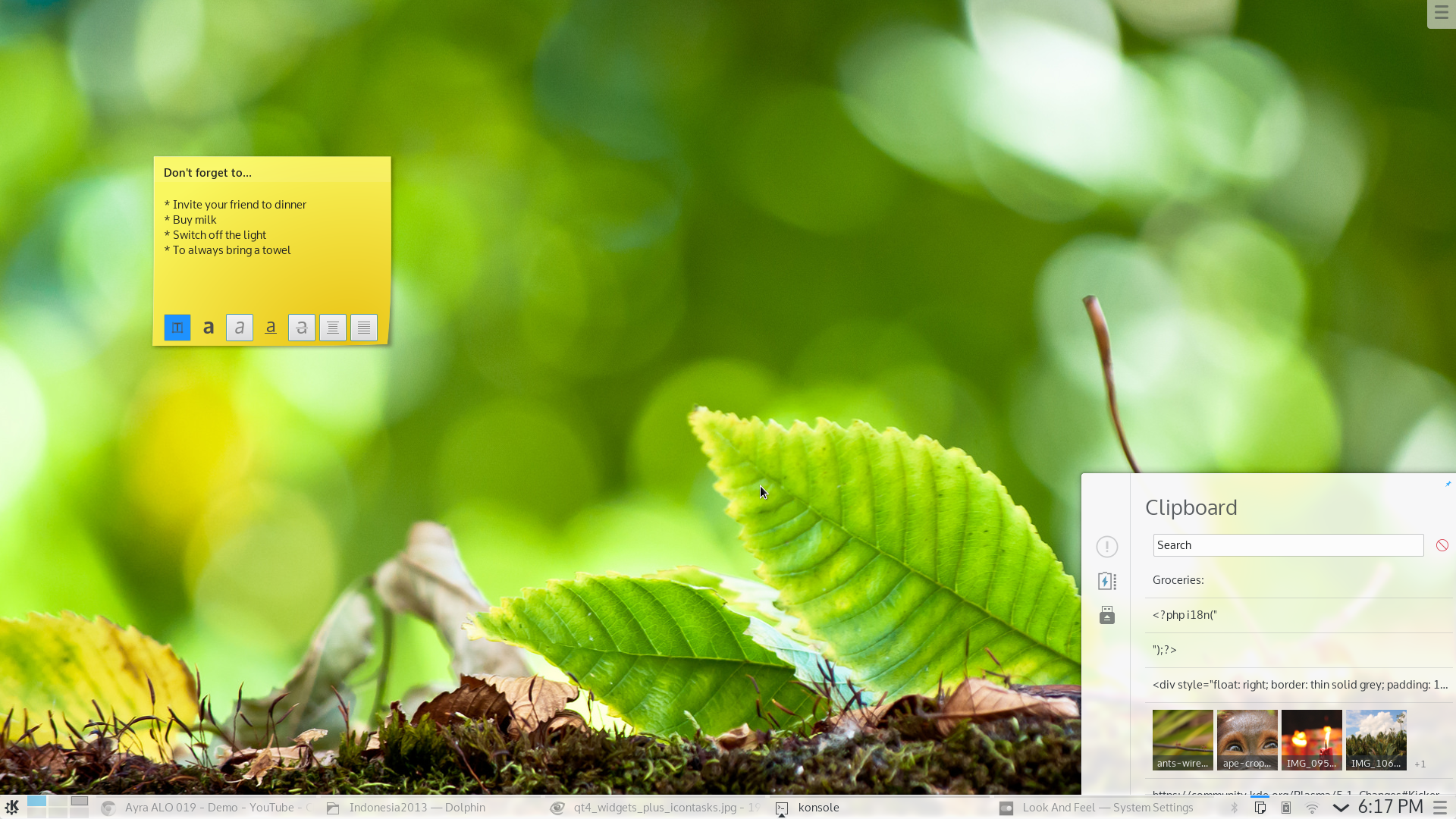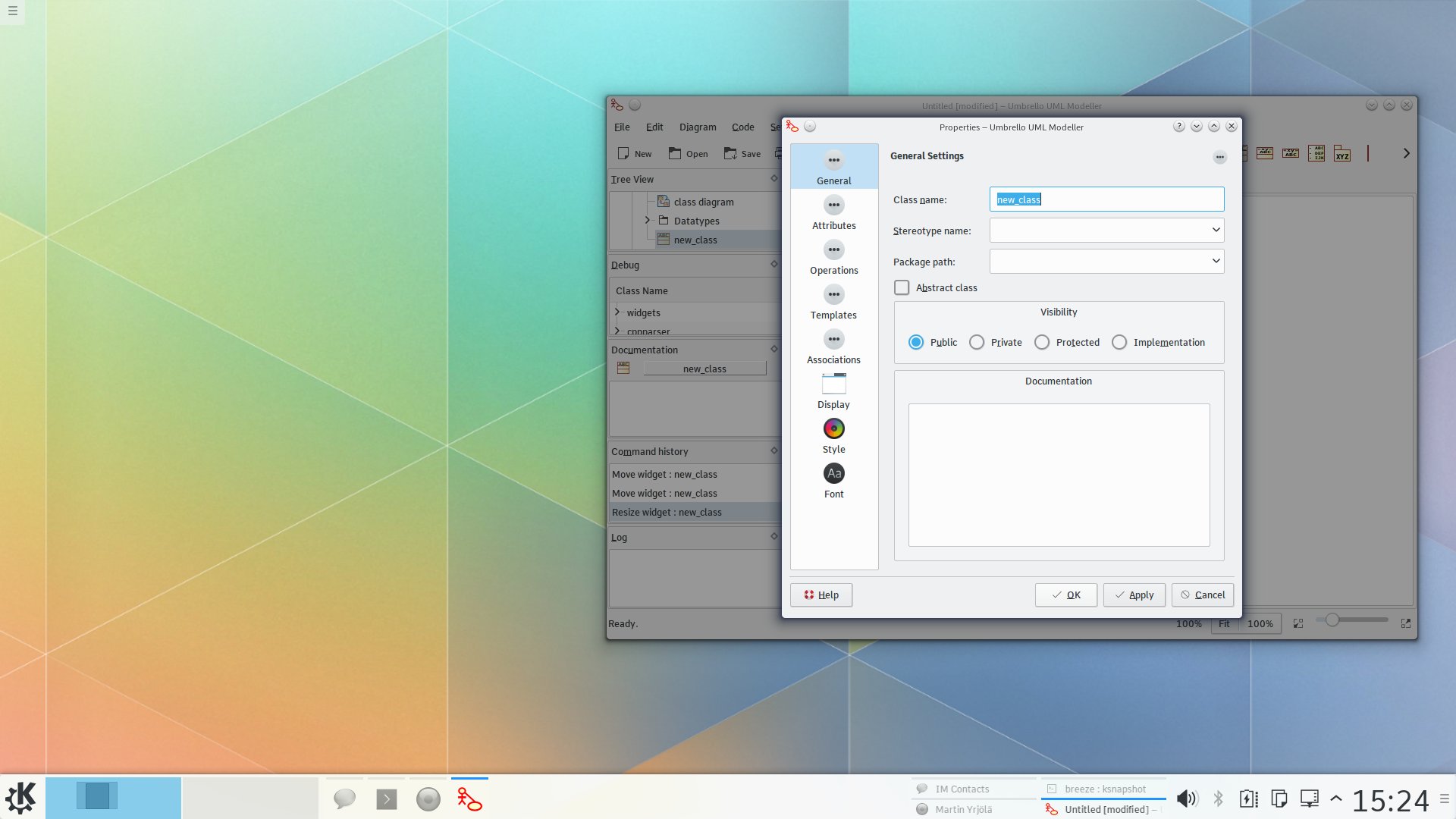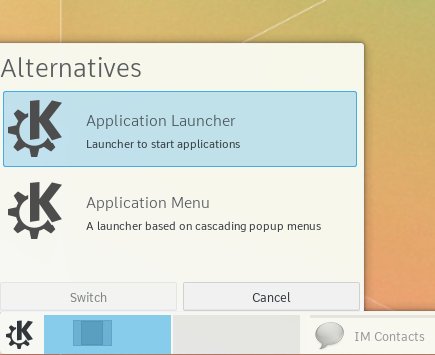Live Images
The easiest way to try it out is with a live image booted off a USB disk. Docker images also provide a quick and easy way to test Plasma.
Download live images with Plasma Download Docker images with Plasma
Plasma 5
October 15, 2014. Today, KDE releases Plasma 5.1.0, the first release containing new features since the release of Plasma 5.0 this summer. Plasma 5.1 sports a wide variety of improvements, leading to greater stability, better performance and new and improved features. Thanks to the feedback of the community, KDE developers were able to package a large number of fixes and enhancements into this release, among which more complete and higher quality artwork following the new-in-5.0 Breeze style, re-addition of popular features such as the Icon Tasks taskswitcher and improved stability and performance.
Those travelling regularly will enjoy better support for time zones in the panel's clock, while those staying at home a revamped clipboard manager, allowing you to easily get at your past clipboard's content. The Breeze widget style is now also available for Qt4-based applications, leading to greater consistency across applications. The work to support Wayland as display server for Plasma is still ongoing, with improved, but not complete support in 5.1. Changes throughout many default components improve accessibility for visually impaired users by adding support for screenreaders and improved keyboard navigation.
Aside from the visual improvements and the work on features, the focus of this release lies also on stability and performance improvements, with over 180 bugs resolved since 5.0 in the shell alone. Plasma 5.1 requires KDE Frameworks 5.3, which brings in another great amount of fixes and performance improvements on top of the large number of fixes that have gone into Plasma 5.1. If you want to help to make more of this happen, consider a donation to KDE, so we can support more developers getting together to make great software.

Breeze Theme for Qt 4
A new Breeze widget theme for Qt 4 lets applications written with KDE Platform 4 fit in with your Plasma 5 desktop.
The Breeze artwork concept, which has made its first appearance in Plasma 5.0 has seen many improvements. The icon set is now more complete. The icons in the notification area in the panel have been touched up visually. A new native widget style improves rendering of applications used in Plasma. This new native style also works for Qt 4 letting applications written with KDE Platform 4 fit in with your Plasma 5 desktop. There is a new System Settings module that lets you switch between desktop themes.
Overall, Plasma 5.1's Look and Feel refines the experience found in 5.0 noticeably. Behind all these changes are improvements to the Human Interface Guidelines, which have led to a more consistent overall user experience.

Icons-only Task Manager
Plasma 5.1 brings back many features that users have grown used to from its 4.x predecessor. Popular additional widgets such as the Icons-only Task Manager, the Notes widget and the System Load Viewer make their re-entry. Support for multiple time zones has been added back in the panel's clock. The notifications have been visually improved, along with many bigger and smaller bug fixes.

Applet Switcher
A new feature allow you to easily switch between different widgets which share the same purpose. Changing the application launcher for example has become much easier to discover. Plasma panels have new switchers to easily swap between different widgets for the same task. You can select which application menu, clock or task manager you want with ease. The new Clipboard widget offers a redesigned user interface on top of Plasma's venerable clipboard manager, allowing the user to easily use the clipboard's history and preview files currently in the clipboard. Plasma's alternative launcher, Kicker has seen a large number of improvements, among which better accessibility and integration with the package manager.
Thanks to two Google Summer of Code projects, the Plasma Media Center and tablet-centric Plasma Active user experiences now have basic ports available from Git, but are not release-quality yet.
Further progress has been made on Wayland support. A new window manager binary 'kwin_wayland' now complements the existing 'kwin_x11', and is equipped with the ability to start a nested X server for compatibility with X11-based applications. A newly-created KWayland library provides Wayland setup information to KInfoCenter and other consumers. More work is needed and ongoing to run the Plasma workspace on Wayland; we expect this to bear fruit for end-users in 2015.
Plasma 5.1 provides a core desktop with a feature set that will suffice for many users. The development team has concentrated on tools that make up the central workflows. While many features known from the Plasma 4.x series are already available in Plasma 5.1, not all of them have been ported and made available for Plasma 5 yet. As with any software release of this size, there may be bugs that make a migration to Plasma 5 hard for some users. The development team would like to hear about issues you may run into, so they can be addressed and fixed. We have compiled a list of problems we are aware of, and working on. Users can expect monthly bugfix updates. A release bringing new features and brinding back even more old features will be made in early 2015.
The easiest way to try it out is with a live image booted off a USB disk. Docker images also provide a quick and easy way to test Plasma.
Download live images with Plasma Download Docker images with PlasmaDistributions have created, or are in the process of creating, packages listed on our wiki page.
Note that packages of this release might not be available on all distributions at the time of this announcement.
Package download wiki pageYou can install Plasma directly from source.
Community instructions to compile it Source Info PageYou can give us feedback and get updates on our social media channels:
Discuss KDE on the KDE Forums.
You can provide feedback direct to the developers via the #Plasma Matrix channel, Plasma-devel mailing list or report issues via Bugzilla. If you like what the team is doing, please let them know!
Your feedback is greatly appreciated.
KDE is a Free Software community that exists and grows only because of the help of many volunteers that donate their time and effort. KDE is always looking for new volunteers and contributions, whether it is help with coding, bug fixing or reporting, writing documentation, translations, promotion, money, etc. All contributions are gratefully appreciated and eagerly accepted. Please read through the Supporting KDE page for further information or become a KDE e.V. supporting member through our Join the Game initiative.
KDE is an international technology team that creates free and open source software for desktop and portable computing. Among KDE’s products are a modern desktop system for Linux and UNIX platforms, comprehensive office productivity and groupware suites and hundreds of software titles in many categories including Internet and web applications, multimedia, entertainment, educational, graphics and software development. KDE software is translated into more than 60 languages and is built with ease of use and modern accessibility principles in mind. KDE’s full-featured applications run natively on Linux, BSD, Windows, Haiku, and macOS.
Trademark Notices.
KDE® and the K Desktop Environment® logo are registered trademarks of KDE e.V..
Linux is a registered trademark of Linus Torvalds. UNIX is a registered trademark of The Open Group in the United States and other countries.
All other trademarks and copyrights referred to in this announcement are the property of their respective owners.
For more information send us an email: press@kde.org